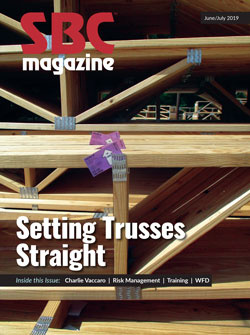The Godfather of an Industry
The Godfather of an Industry
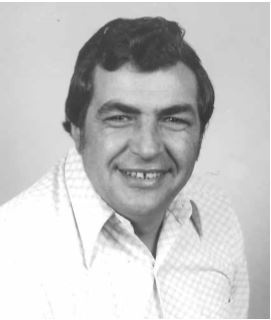
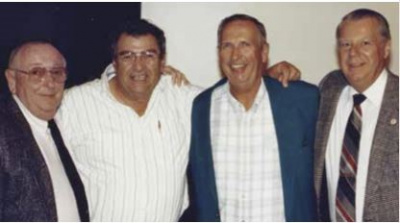
The “four pillars” of Alpine, from l. to r., Walt Friedly, Charlie Vaccaro, Charlie Harnden, and Bill McAlpine
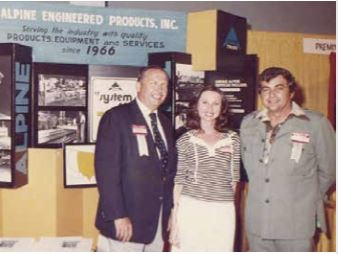
An early Alpine booth in 1966 with Charlie Harnden and Charlie Vaccaro
When Charlie Vaccaro passed away in February, the industry lost one of its most prolific promoters. Charlie was one of the original “four pillars” of Alpine and served as a mentor to many throughout the industry in his almost 50 years in the business. When he retired, it took three men to take over his sales territory, and some would argue his absence is still felt today. He received SBCA’s Industry Leadership Award in 2007, and he continued to exhibit that leadership long after he stopped serving customers.
If you had the chance to meet him, you liked him. As many attest, you couldn’t help it. To best appreciate who Charlie was, and the significant impact he had on the truss industry, it’s helpful to understand the many roles he took on during his incredible life.
Family Provider
After returning from the Korean War, Charlie went to work with his dad at Sperry Aeronautics in Long Island, one of the leading manufacturers of military airplane technology. While learning engineering concepts on the job, he also went back to school under the G.I. Bill. He met his wife, Delores, shortly after the war and they settled in his hometown of Brooklyn.
He loved to tell people about the first time he brought Delores home to meet his family. “I went into the kitchen with the women, who were preparing the meal, while the men stayed out in the living room. Back then, Sunday meals were a big affair and all the cousins and siblings squeezed in around the table to eat,” Delores recalls. “Everyone was laughing and arguing loudly in Italian. It was quite something. After we left, Charlie asked me if I had learned anything. I told him no, it seemed everyone was talking but no one was listening!”
A little over a year after their first child, Karen, was born, Delores took her down to spend time with family in North Miami, Florida. The recent Brooklyn winters had been harsh and the milder Florida weather provided welcomed relief. Shortly after she arrived, Delores discovered she was pregnant with their second daughter, Lauren. “Charlie told me to stay in Florida and he would move there,” says Delores. “We had visited before on vacation and he had loved it.”
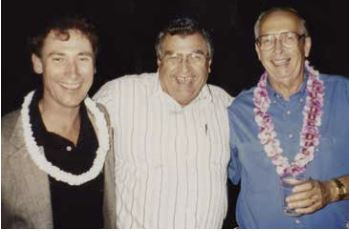
The three Charlies, from l. to r., Charlie Hoover, Charlie Vaccaro, and Charlie Harnden
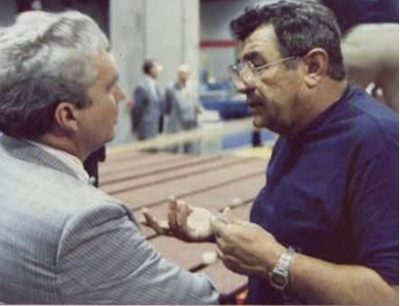
Unfortunately, it was difficult for Charlie to find a job. Back in the mid-1950’s, Florida relied mainly on the tourism industry and jobs were typically found through word-of-mouth. Ultimately, that’s exactly how Charlie got his start in the truss business. Delores’ uncle was a television repairman and was asked to repair the TV belonging to the owner of Empire Roof Truss. During the repair, the owner mentioned he was looking for a good draftsman. Charlie was hired shortly thereafter and began learning about the newly invented metal connector plate. He instantly fell in love.
He was eventually hired by the inventor of the connector plate, A. Carol Sanford, as a salesman. Charlie traveled all over Florida (and as far north as Tennessee) convincing anyone who would listen how the metal connector plate could revolutionize home construction. While working for Sanford, he befriended Charlie Harnden, Bill McAlpine and Walt Friedly. In 1966, those three left to form their own company, and shortly thereafter they convinced Charlie to join them.
While Charlie was excited to work with his friends, he did have some anxiety about it. He had a young family to support and while he truly believed in the product, it was a new company in a fledgling industry. Instead of becoming an employee of Alpine, he chose to be an independent contractor. “He thought that if things ever got difficult, it would be easier for him to pick up work on the side to support our family,” says Delores. His initial anxiety didn’t seem to temper his bravado though. Charlie is famous for telling Bill, “Hire another engineer; you’ll need him to be ready for all the business that’s about to come our way.”
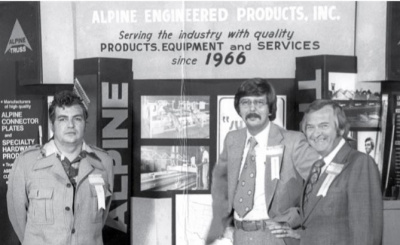
Another 1966 trade show, from l. to r., Charlie Vaccaro, John Carter, and Howard Markle
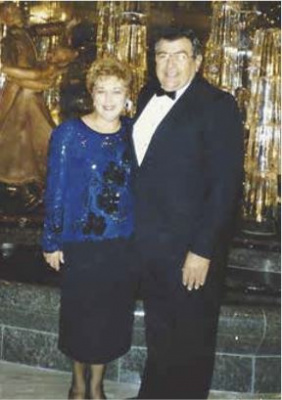
Charlie and his wife, Delores
Selfless Salesman
When Charlie joined Alpine, he brought with him an extensive list of potential customer contacts he had developed throughout the South while working for Sanford. “It always blew me away. He developed such a loyal customer base throughout the South,” says Curt Burlingame, Sales Manager for Seminole Trusses. Curt supported Charlie at Alpine in the early 1980s and eventually took over part of Charlie’s sales territory when he retired. “They all loved him. I think it was because he was so good at listening and finding a way to relate to every individual no matter what they did in the truss business,” says Curt.
In talking with those who worked with Charlie, it is clear he had a deep appreciation for what the truss industry could become and an eye for opportunities that could help his customers succeed and grow. He also treated all of his customers equally. “There’s an old adage in sales that you do 80 percent of your sales with 20 percent of your customers,” says Curt. “He never agreed with that sales approach. He always stressed you take care of all of them because you never know who is going to grow and become your next big customer.”
Jim Finkenhoefer, VP of operations for True House, was an Alpine salesman in the early 1990s in Alabama and worked closely with Charlie. “Charlie was more concerned with the success of his customer,” says Jim. “If he thought someone else’s equipment would serve a need of a customer better, he’d make that recommendation. He knew he’d share in their success eventually.”
There wasn’t anything he wasn’t willing to do to help a customer either. Both Curt and Jim remember times when an Alpine customer would call up with an emergency. Either a piece of equipment broke down or a customer didn’t have the plates they needed to work on a job. Charlie was known to throw the needed part or a box or two of the needed plates and drive them, sometimes overnight, to the customer so they could get up and running the very next day.
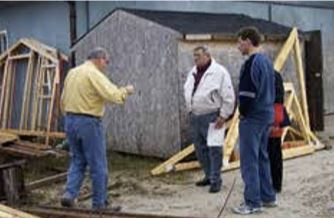
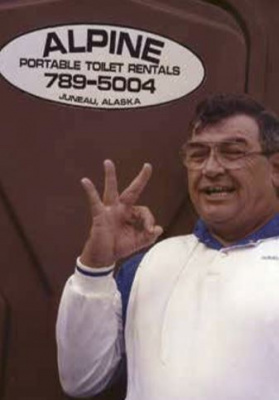
He even helped a customer buy the used equipment they needed. Don Thiel, founder and owner of Carpenter Contractors of America, met Charlie in the early 1980s when they opened a plant in Pompano Beach, Florida. “Charlie always knew what he was talking about and I trusted him,” says Don. “I had an old roller press break and they didn’t make it anymore. I asked Charlie if he could find me another one. When he came back and told me he had found one I then asked him if he could go back and buy it for me. When he asked me what I was willing to pay for it, I just gave him a line of credit and asked him to get the best deal he could.” Charlie ended up getting the press for thousands less than Don was willing to pay and their friendship bloomed over the next 35 years.
“Charlie’s selfless approach to his customers had a profound effect on how all of Alpine did business,” says Mike Martz, eastern regional sales manager for Alpine, and a 30-year veteran who worked alongside Charlie. “He was so good at taking new ‘Alpinos’ under his wing, getting to know them, and helping them understand how they contributed to Alpine’s culture. He emphasized how important it was to be responsive to the needs of every customer.”
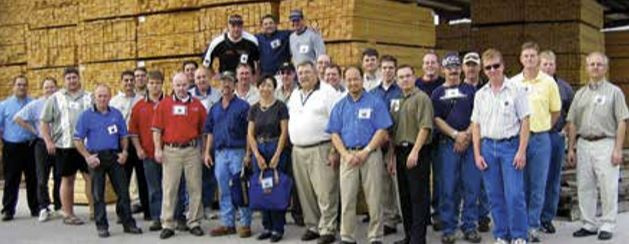
‘The Godfather’
“Charlie may have been a salesman, but he really thought of himself as his customer’s partner,” says Jim. Again, Charlie had a great understanding of the industry and was always looking for ways to help his customers seize opportunities to grow and thrive. “When I decided to leave Alpine and go into partnership with Richard Brown at Truss Systems in Georgia, I called Charlie to get his advice. He gave me great advice that I still rely upon today,” says Jim.
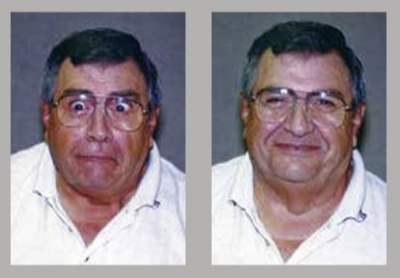
“Charlie never stopped mentoring me,” echoes Curt. “Even after I left Alpine and started my own steel truss business, Charlie would call me up and offer me helpful advice on how to run my business.”
Another long-time friend and customer, John Herring, owner of A-1 Roof Trusses, describes Charlie this way, “He was the Godfather. He treated everyone well and you couldn’t help but like him. He wanted you to grow and prosper, so his advice was always from that perspective.”
John relates how Charlie was so focused on making sure his customers’ needs were met, and when they had a good idea he wanted to figure out how Alpine could implement it. “When he heard a good idea, he’d run with it. I remember telling Charlie how we needed a half-nail plate, half-grip plate,” says John about the origin of the piggy-back plate. “Alpine said it wasn’t really possible because of the labor involved in taking out the dye and stamping the plate twice to make it. Charlie just figured out how they could make it efficiently, then went around and began selling the plate to all his customers forcing Alpine to manufacture a lot of them!”
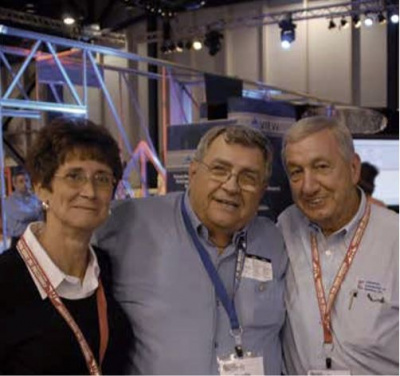
Charlie with Mary Emonds and Don Thiel, owner of Carpenter Contractors of America, at BCMC in 2006
In essence, Charlie was one of the original truss consultants who focused on production issues. “Through his interactions with customers, he developed a real good sense for what all CMs needed,” says Mike. “He was one of the driving forces behind Alpine getting into the production equipment business, as well as the design software business. He wanted Alpine to seize every opportunity to offer the customer something that would help them do things better.”
Alongside all of this industry knowledge and selfless advice, Charlie also brought a healthy dose of Italian humor. “Charlie always had a joke,” says John. “You always knew when he arrived because he’d start sharing some funny story or joke and his big arms would be waving all over as he told it.” Some have said his entrance into a room was akin to a small hurricane. Curt remembers, “Whether Charlie was upset or excited, he was loud!” That force of personality also meant you didn’t want to get into an argument with him. “He was tough to disagree with,” John lightheartedly points out. “You never really won with him, you just had to eventually move on.”
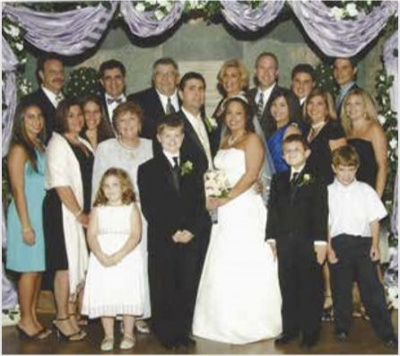
No Godfather reference would be complete without a daughter’s wedding, and Charlie didn’t disappoint. Jim and his wife were invited to the wedding of one of Charlie’s daughters in Georgia. Jim remembers it was an extravagant affair. He found Charlie at one point in the evening and, apologizing for being presumptuous, asked Charlie what it had cost him. “Charlie told me he had no idea. He didn’t want to fight with his wife or his daughter about nickels and dimes so he had simply gone to the bank and opened a line of credit,” says Jim. “He told me he only wanted to cry once and that would be when he went to the bank on Monday and saw how much it had cost him!”
A Big Pile of Mush
While Charlie was considered an amazing salesman and a great friend to many of his customers, they all acknowledge his family was the most important thing to him. “His family was everything to him,” says Curt. “When you saw him with them you saw that instantly.”
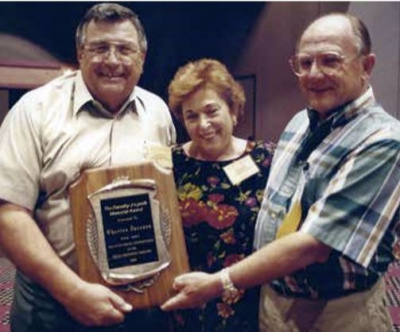
Charlie with his wife Dolores in 1996 as he receives an award from Terry Burcaw of 41 Truss for SETMA’s "Outstanding Contributions to the Building Component Industry”
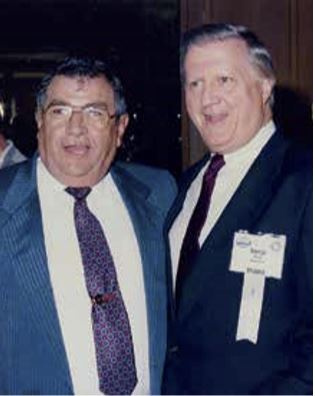
Charlie Vaccaro and New York Yankees owner George Steinbrenner at the 1995 FBMA Show in Florida
Charlie and Delores had five children: Karen, Lauren, Chuck, Valerie, and Victoria. When Charlie passed away, he also had 13 grandchildren and two great-grandchildren. In the early years, Charlie was on the road all the time. “Sometimes he’d be gone for weeks,” says Delores. “It was difficult but Charlie worked so hard at it because he wanted to provide for his family. He wanted to make sure they were safe and secure and all his children could have a good education to build their lives upon.”
Valerie remembers that when the family went to Miami Dolphins games, Charlie would park very far away because it was cheaper. “It was things like that where he instilled in us the value of a dollar,” says Valerie. “He’d say, ‘I think poor.’ He sacrificed all he could for us so he could give us a good life.”
And while Charlie has been described as everything from a hurricane to the Godfather, he also had a side to him very few outside his family ever saw. “He had a tough exterior and played that role very well, but inside he was really just a big pile of mush, particularly with his grandkids,” says Valerie.
Charlie’s knowledge, personality, and sacrificial attitude played a very significant role in the growth and success of Alpine from its earliest days. There’s a reason why he is referred to as one of its “four pillars.” It’s hard to argue the fact that Alpine’s early expansion played a big part in shaping the truss industry and influencing what it has become today. All those who knew Charlie will miss him but everyone in the industry has benefited from the work he did.

